
Context is everything. Each encounter has the potential to be meaningful. Each passing glance could mean more. If only the timing were right. If only we were the right age, at the same place in our lives.
The romance of someplace else does not have to be a physical place. An emotional connection can be that place. The bond between lovers, strangers, passengers, can exist in motion, stillness, amongst a crowd or hidden under covers.
The following are films which take us to private places, within and without. Context. Two strangers in a strange land, finding a kinship in Tokyo, a refuge that would not have been apparent, back home. Sometimes we forget how to look at one another, until we reframe. When time is pressing, focus gets sharper, the comforts of routine fall away and anything becomes possible.
Time, memory, love and loss, the hazy fuzz, static and poetic blaze of the immediacy of human connection; of love’s first blush. When two people see, in each other, that undiscovered country to which others are blind. A safe haven, a secret refuge, no matter for how long, is a flame worth stoking. “Tell me one thing, more than this…”
1. Brief Encounter (Lean | 1945)
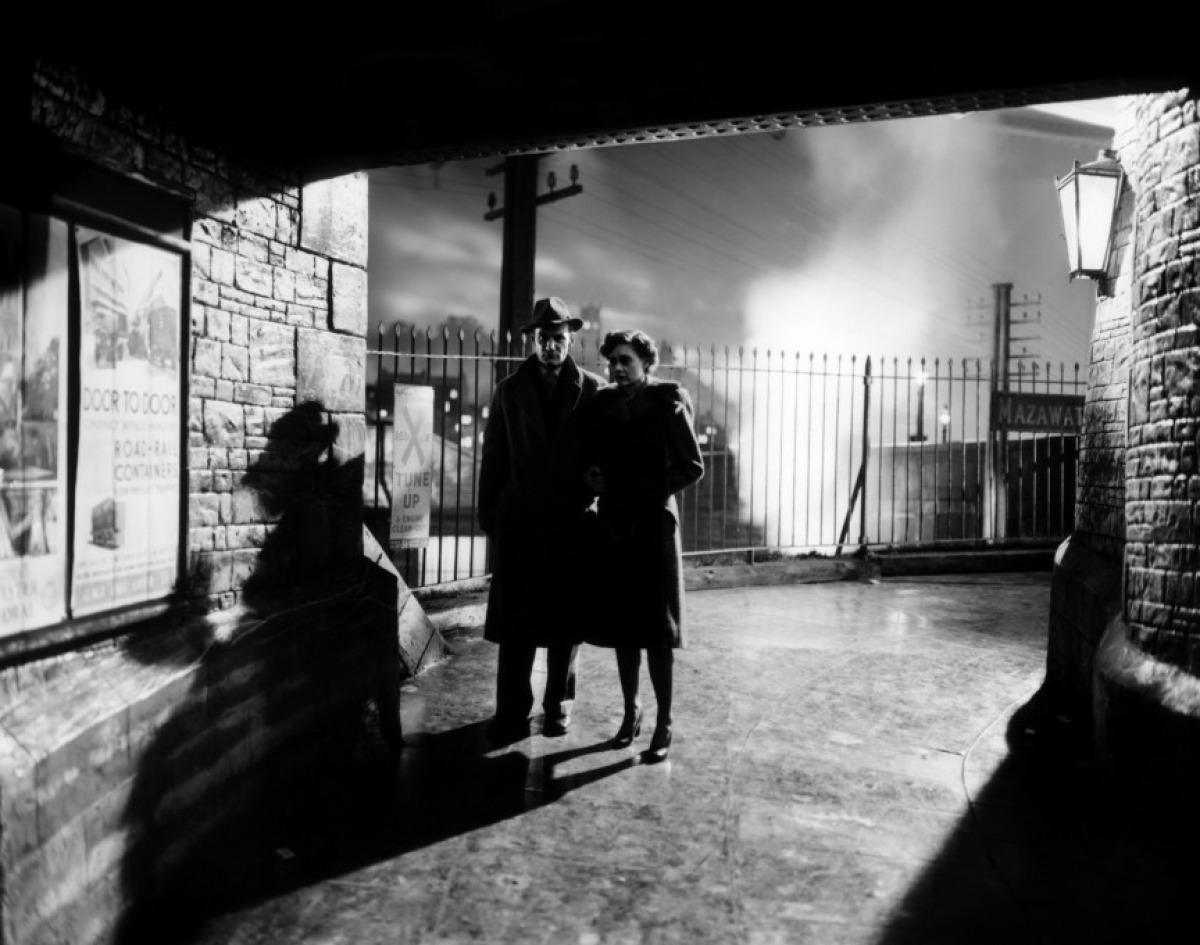
“This can’t last. This misery can’t last. I must remember that and try to control myself. Nothing lasts really. Neither happiness nor despair. Not even life lasts very long. There’ll come a time in the future when I shan’t mind about this anymore, when I can look back and say quite peacefully and cheerfully how silly I was. No, no, I don’t want that time to come ever. I want to remember every minute, always, always to the end of my days.”
Thursday. Thursday was their private Oasis. It was a place into which Laura and Alec could retreat into each other. Like the scattering light between the passing branches of trees out of a railway carriage window, they cast their shadows over each other’s faces.
For Laura, it was a guilty pleasure cruise away from a dried up marital bond. For Alec, it was the innocence and purity of a woman with grit in her eye. Each of these perfect strangers found a way to escape from an unfulfilled life. Their special place was each other’s connection. Every Thursday.
Brief Encounter was far ahead of its time and has aged, gracefully. This frank and honest story of a chance encounter, which leads to a deeper bond, is rife with passion and pathos of a tortured romance, with nary a hint of the saccharine qualities of romance films of the time. This honest portrayal of a powerful and impossible love is still quite shocking, today.
“I stared out of that railway carriage window into the dark and watched the deem trees and the telegraph posts slipping by. And through them I saw Alec and me.”
2. Copenhagen (Raso | 2014)
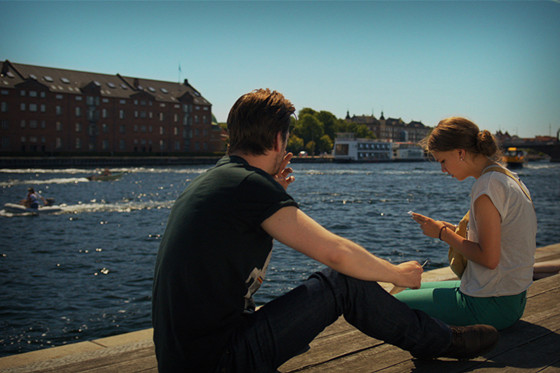
William is an American, investigating his family history by way of a trip to Europe with his closest friend. While this was supposed to be a bromance, of sorts, he is quite disgruntled by his friend Jeremy’s decision to bring along his girlfriend.
William is on a mission to deliver a letter, written by his father to his grandfather. As his boorish behaviour begins to strain his bond with Jeremy, he meets and befriends a young girl named Effy who, unbeknownst to him, is only fourteen years old. He requests her help in translating the letter, the truth of which will come to reveal a shocking secret buried within his family’s lineage.
Effy is wise beyond her years and marks a stark counterpoint to William’s boyish immaturity. The two of them form a bond which becomes quite edifying for William, who is shown how limited his perspectives towards human relations really are.
Copenhagen is a leisurely paced coming of age story about family secrets and blooming romance in a distant land. A story enabled by its foreign context and the damage broken communication can cause. In Effy’s own words, “that is the perfect relationship. You can look to the left, and you can look to the right and both seas are there, and they can meet in the middle, but they never lose themselves in each other. They’re always themselves no matter what.”
3. Before Sunrise (Linklater | 1995)
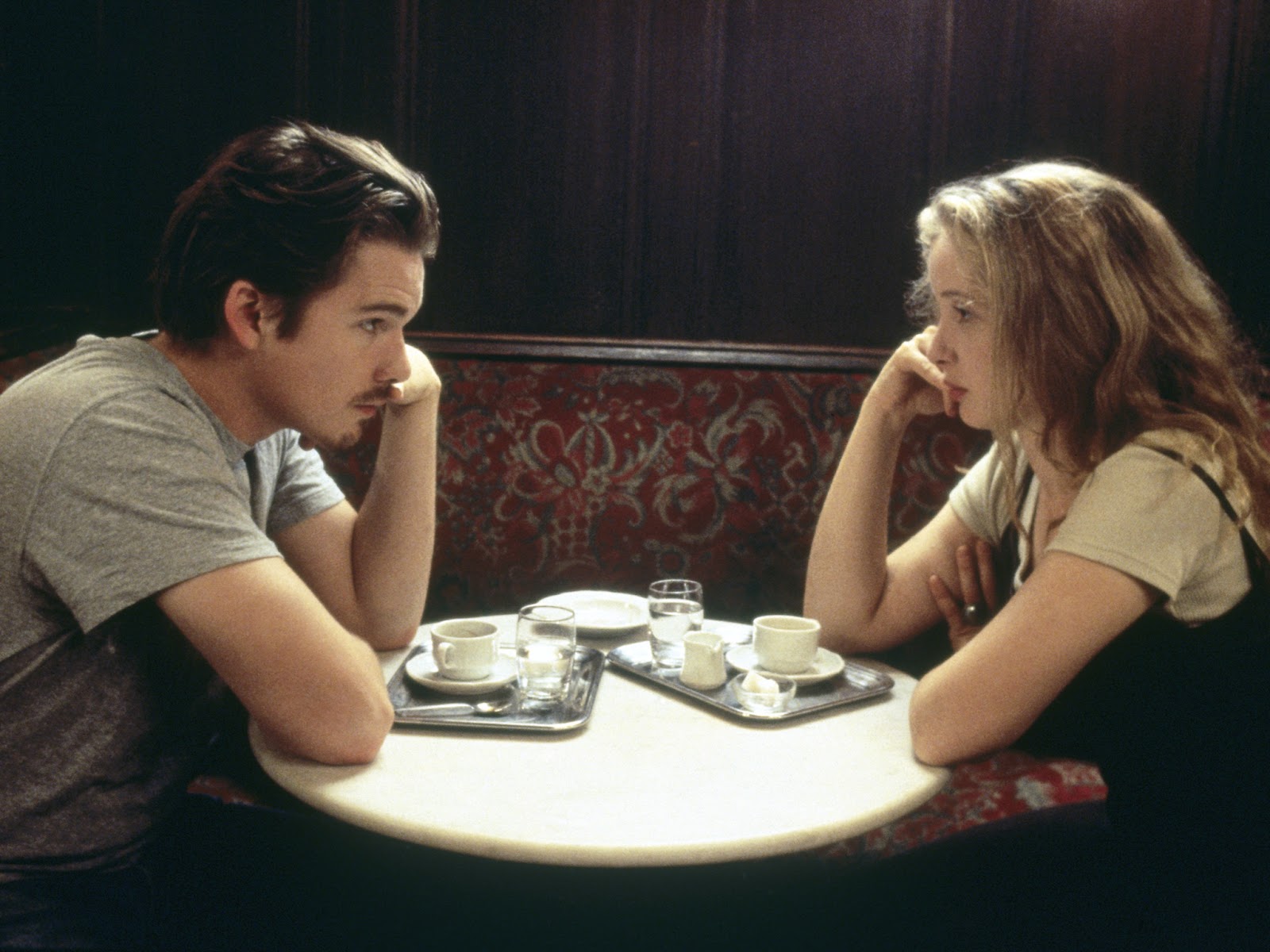
Vienna. Celine and Jesse. A life changing chance encounter on a train. The time they spend together will span one night. This night is their island where a series of candid conversations, spurred forth from their explorations of a foreign city that mirrors their explorations of each other. Away from the familiarity of their habitual lives, the two strike a bond that may not otherwise have happened. They each find a home in each other’s company.
As the clock winds down, these two wandering souls share their theories on living, dying, relationships and fate. The two pickup, from the start, with a level of familiarity that makes it seem as if they are only just picking up from a previously engaged conversation. They first bond over a shared disdain for a loudly bickering couple, further down the aisle of their train car. Jesse offers a spontaneous invitation and, soon enough, they disembark the train, together, with a single night of possibilities before them, until Sunrise…
The story of Jesse and Celine is a snapshot of young love and the fleeting blush of first contact and deep connection. They part ways the same way they met, at a train that whisks Celine back to her life, leaving Jesse alone to deal with his own. The severed connection is deeply felt. We drift away to vacant places, recently visited by them, and they now appear ghostly in their absence.
“Think of it like this: jump ahead, ten, twenty years, okay, and you’re married. Only your marriage doesn’t have that same energy that it used to have, y’know. You start to blame your husband. You start to think about all those guys you’ve met in your life and what might have happened if you’d picked up with one of them, right? Well, I’m one of those guys. That’s me y’know, so think of this as time travel, from then, to now, to find out what you’re missing out on.”
4. La Jetee (Marker | 1962)
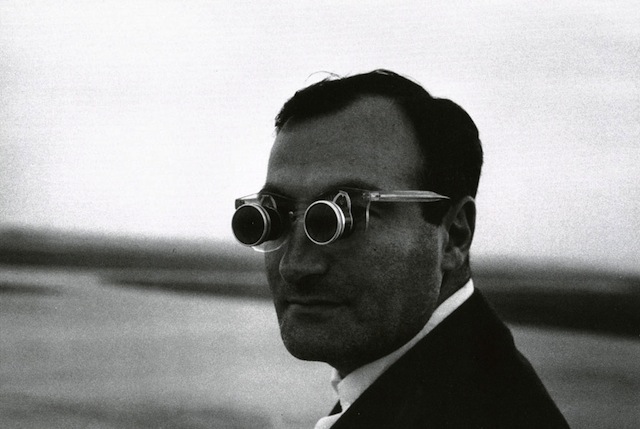
“Nothing distinguishes memories from ordinary moments. Only later do they become memorable by the scars they leave.”
Chris Marker’s LA JETÉE is a legendary short film by Chris Marker (1921-2012). It is a story of time and one man’s recollection of an image from his childhood of a woman’s face and a man’s death, at Orly airport, in Paris, shortly before the outbreak of World War Three. It is an image he would only come to grasp years later when, as a survivor of the nuclear fallout, he subjects himself to an experiment in the underground tunnels into which the remaining survivors have been left to inhabit.
This man’s vivid recall of that childhood experience, convinces scientists that he should be the subject of an experiment with time. He is to be sent back to that day in order to answer some important questions concerning the fate of humanity and a woman’s face. The face that is his window in and his vessel back.
Shot, with the exception of one shocking image, with a 35mm still camera, LA JETÉE takes us into a mosaic of disparate, yet connected, memories in a way that no film had ever done before and is, to this day, an unequaled meditation on the nature of time, memory and love.
5. The Fountain (Aronofsky | 2006)
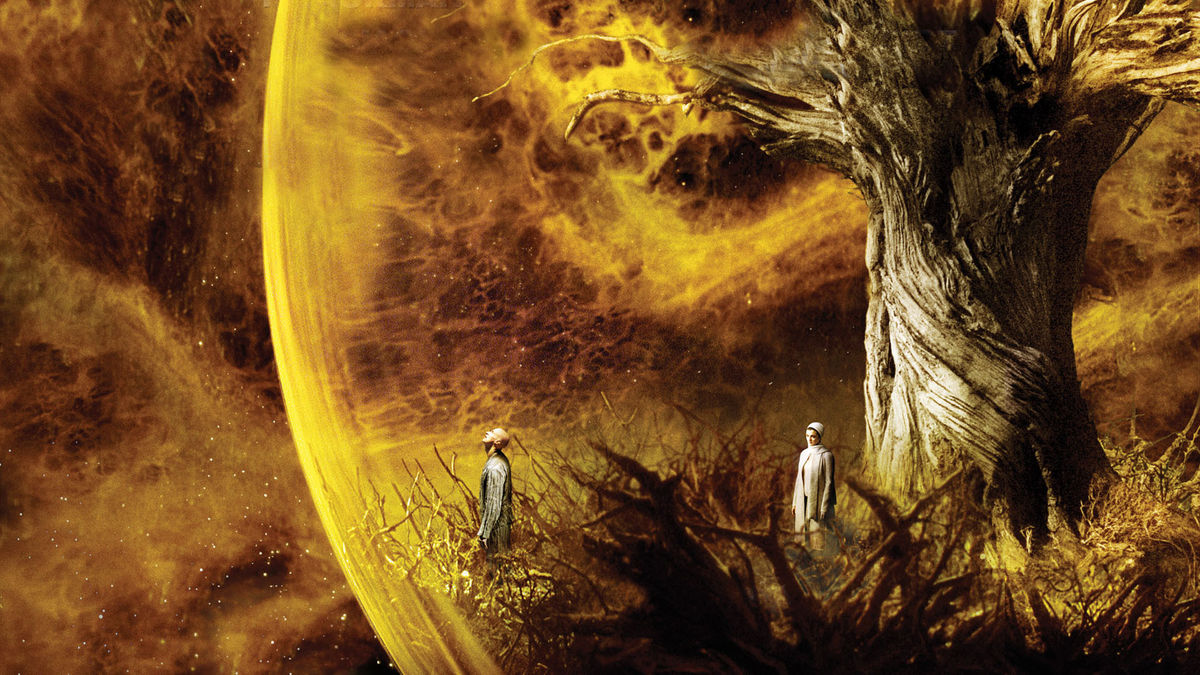
“Death is a disease, just like any other. There is a cure and I will find it.”
Tomas Creo is is the last man, drifting through space and time, care of the carefully preserved Tree of Life. He pushes towards the outer reaches of space in order the cure his wife, Isabel, of her cancer. He will stop at nothing to stop her death. Silent, drifting towards a dying star, he mixes inks in order to add one more tattoo to his series of growth rings on his arm. One for every year of his resistance to letting go, to “finishing it.”
Isabel has written a story that spans three timelines, beginning with an ancient Mayan myth of resurrection, passing through the present day struggles of a doctor obsessively trying to cure his wife of her “disease.” She has left the third and final act in his hands. Zebulba, a dyeing star, enveloped by a nebula, may be the key to renewal.
Alone, with the blank pages, yet to be written, he surges through the vacuum of space. With special effects, created organically, bolstered by Hugh Jackman’s overwhelmingly emotive performance, space has never looked or felt like this before, or since. “All these years, all these memories, there was you. You pull me through time.”
Daren Aronofsky has crafted a polarizing exploration of the human desire to cheat dearth and discover immortality. Isabel urges him to “finish it,” to no avail. Only when he is able to transcend his corporeal prison is he able to understand the meaning of her final message of love to him.
6. Eternal Sunshine of The Spotless Mind (Gondry | 2004)
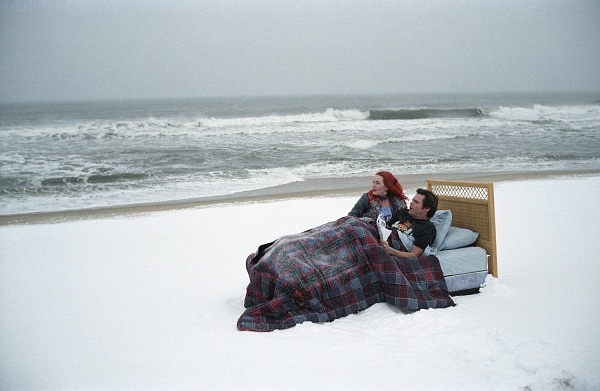
“Meet me in Montauk.”
Joe Barish has recently come out of an intense relationship. The ending of which was so traumatic that he decides to undergo a radical procedure in order to eradicate all traces of it from his memory. In order to remove the memory of a person, he must purge every single ancillary connection to that person.
Shortly after this procedure, he meets an unpredictable and passionate, Clementine, on the commuter train and her colourful brashness seems to be a potential antidote to the hole he has dug out of his mind. It would seem that fate has somehow brought these two strays together for their encounter on the train to Montauk, on this day, and they have an immediate, if awkward connection.
Clementine has recently had a relationship removed from her memory, as well. Her bright orange hair is a stark contrast to this world of grey. This train is taking them to a place with great significance for them both. Michel Gondry, working in tandem with Charlie Kaufman, has woven a Kafkaesque romance of love’s first blush, subsequent breakdown and ultimate renewal. These two have a shared connection to a place in their minds, that each have tried to escape, only to find their way back to.
The title of the film, taken from the poem “Eloisa and Abelard,” by Alexander Pope, could not be a more fitting descriptor for a film about removing memories of pain in order to preserve happiness. These two come to learn, however, that the pleasure and pain are inextricably linked.
When they realize that they have each already been through the same relationship, Joel is willing to try again because he would rather have the experience than the empty void left behind in the wake of his attempt to remove it. His desperate attempts to hide these memories from extraction only serve to strengthen his love.
When Clementine warns him that the second try could end the same way, his simple shrug of “okay” is a beautiful pronouncement of love and confirmation that some things are worth protecting, whether they be a place or a bond between lovers.
7. Jules and Jim (Truffaut | 1962)
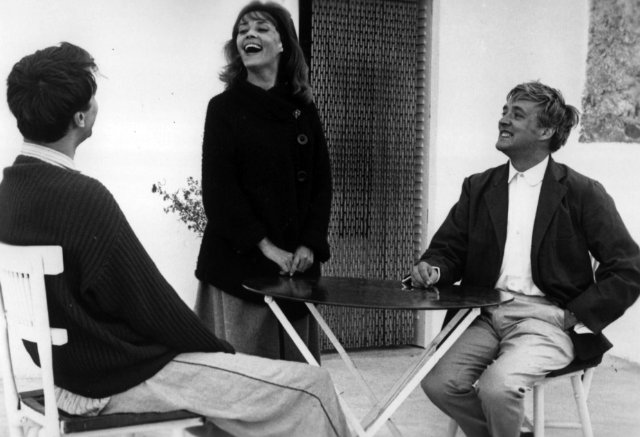
The French New Wave, or Nouvelle Vague, was often focused on the romance of the real. From the aesthetic nuances to the exploration of even the banalities of daily life. Half of Godard’s breathless, famously, takes place in an hotel room, for example.
Enter Jules and Jim. This is a story of two wartime men who find a deep friendship in each other, bonding over art and culture, most notably an ancient statue they see at a slideshow. Together, they embark on a trip to an island on the Adriatic Sea, to witness it in person.
The film, taking place throughout France, Austria and Germany, documents their budding, brotherly connection, fuelled by mutual passions, up until the point at which the synergy of these shared loves is threatened by their shared love for the same woman, Catherine, played by Jeanne Moreau. They are drawn to her resemblance to this goddess. For a while the three of them form a lively familial bond, each vying for her attentions while enjoying her aloof reciprocity.
The dynamic shifts, however, when Jules pursues a more strictly romantic bond with Catharine. Despite the fact that both men end up serving opposing sides in the war, they remain anchored by their connection to their goddess.
Catherine’s inability to have a child further drives a wedges between her and Jim, in addition to their relationship strains. Jim’s abandonment of her leads her to find refugee in Jules who is ultimately forced to watch, helplessly, as she drives her car off a bridge, killing them both.
Employing a barrage of stylistic flourishes, including freezeframe montage, Francois Truffaut weaves an impressionistic tale of an intense love and bond that is, ultimately, tragically shattered. “We played with life and lost.”